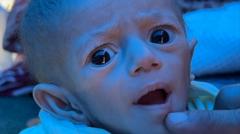In the heart of Gaza, where devastation is a constant backdrop, the plight of the innocents is becoming increasingly dire. Fergal Keane, a BBC special correspondent, has returned to document the heartrending situation of a five-month-old baby girl, Siwar Ashour. As the camera pans past lifeless surroundings, children stand listlessly, their spirits eroded by the prolonged suffering of war and famine.
Under an Israeli blockade that has strangled access to basic necessities, hunger has etched itself into the very fabric of their lives. In the midst of this chaos, a local cameraman—whose identity is withheld for security reasons—has been resolutely chronicling these harrowing experiences for 19 months amid the backdrop of conflict. His mission recently took him to Nasser hospital in Khan Younis, where the frailty of baby Siwar and her afflicted cries deeply resonated within him, compelling him to reach out for support.
Since her discharge, little Siwar has returned to a fragile home, where conditions are grim. Nestled within a one-bedroom shack shared by her mother, Najwa, and grandmother, Reem, survival hinges on scant provisions. As Najwa reveals, Siwar's condition had shown some improvement during her hospital stay, yet her recovery remains precarious. The infant, whose weight should ideally be around 6 kg, currently struggles at little over 2 kg. Tragically, her allergy prevents her from consuming regular milk formula, further complicating the family’s desperate situation.
Despite a fleeting return home with a single can of specialized baby formula, Najwa's concern grows as supplies dwindle. "The situation is very dire," she laments, expressing doubts over Siwar's fragile condition and fearing for her safety from the insects that swarm due to inadequate living conditions.
For Najwa, this harrowing reality has been compounded by the tormenting sounds of warfare that have signified Siwar’s entire life. Ever since her birth amidst conflict last November, the echoes of artillery and aerial assaults have been a part of daily existence. "She understands these things,” Najwa explains, her voice tinged with pain. “When Siwar hears these sounds, she gets startled and cries."
The overwhelming crisis encompasses not just Siwar but countless mothers struggling to provide sustenance for their children amid widespread malnutrition. Aid organizations have reported a systemic food shortage, a claim vehemently contested by the Israeli military, which asserts that there is no lack of provisions in Gaza. Meanwhile, the international community reacts with increasing alarm as allegations of aid misappropriation surface, sparking tension between conflicting narratives.
As the humanitarian situation continues to deteriorate, emotions run high. Conversations abound regarding military actions against Hamas, and the Israeli government remains unwavering in its resolve until hostages are returned. However, for families like Najwa's, future hopes shrink to mere survival in a grim present.
With 80% of Gaza now classified as a militarized zone, the ongoing humanitarian crisis underlines the stark struggles faced by its residents. "One does not think about the future or the past," Najwa reflects. Silenced by despair, the only question remains: How to endure another day?




















